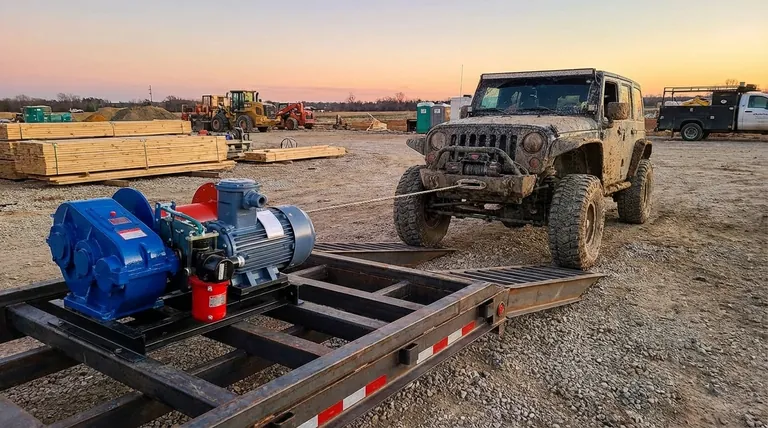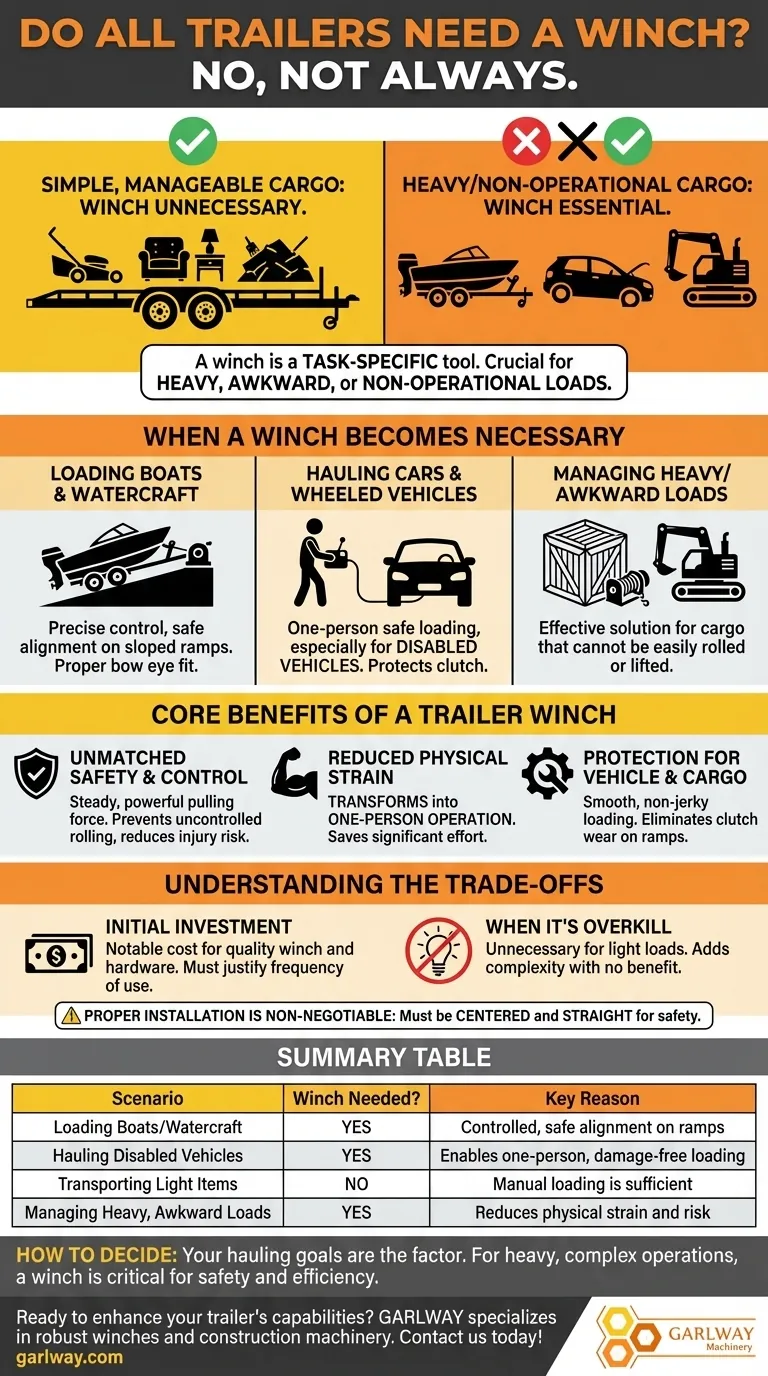No, not all trailers require a winch. The true need for a winch is determined not by the trailer itself, but by the type of cargo you intend to load and the conditions you will be loading it in. For trailers hauling simple, manageable items, a winch is an unnecessary addition; for those handling heavy or non-operational loads, it is an indispensable tool for safety and efficiency.
A winch is a task-specific tool. Its value isn't universal to all trailers but becomes critical when your cargo is heavy, awkward, or cannot be loaded under its own power, such as a boat or a disabled vehicle.

When a Winch Moves From Convenience to Necessity
While not universally required, a winch becomes essential in specific, high-stakes loading scenarios. It provides a level of control and safety that manual loading cannot match.
Loading Boats and Watercraft
A winch is standard on boat trailers for a reason. It allows for the precise, controlled pulling of the boat onto the trailer bunks, ensuring proper alignment with the bow eye and a secure fit.
This process is nearly impossible to do safely by hand, especially on a sloped boat ramp where the boat is subject to currents and wind.
Hauling Cars and Wheeled Vehicles
For car trailers, a winch is a game-changer. It allows a single person to safely load a vehicle without needing to drive it up the ramps.
This is absolutely critical for disabled vehicles with engine trouble or a locked drivetrain. It also significantly reduces wear on a functioning car's clutch.
Managing Heavy or Awkward Loads
The principle extends beyond vehicles. Any heavy or awkwardly shaped cargo that cannot be easily rolled or lifted onto the trailer is a prime candidate for winch-assisted loading.
The Core Benefits of a Trailer Winch
Installing a winch is an investment in safety, efficiency, and equipment preservation. Its advantages become immediately clear during difficult loading operations.
Unmatched Safety and Control
A winch provides steady, powerful pulling force, giving you precise control over the loading process. This prevents uncontrolled rolling and reduces the risk of personal injury or damage to the cargo.
Reduced Physical Strain
Loading heavy items is strenuous and often requires multiple people. A winch transforms this into a simple, one-person operation, saving significant physical effort and making you more self-sufficient.
Protection for Your Vehicle and Cargo
For car hauling, using a winch eliminates the need to "feather" the clutch while driving up steep ramps, a practice that causes significant wear. It ensures a smooth, non-jerky loading process that protects the vehicle's transmission and drivetrain.
Understanding the Trade-offs
A winch is a powerful tool, but it is not the right choice for every situation. Objectively weighing the costs against the benefits is key.
The Initial Investment
A quality winch and the necessary mounting hardware represent a notable cost. This expense must be justified by the frequency and difficulty of your loading tasks.
When a Winch is Simply Overkill
If your trailer is primarily used for hauling light and manageable loads—such as lawn equipment, furniture, or construction debris—a winch is unnecessary. The cost and installation effort would provide no real-world benefit.
Proper Installation is Non-Negotiable
For a winch to be safe and effective, it must be mounted correctly. It needs to be centered and straight, with the cable or strap having an unobstructed line to the attachment point on the cargo.
Improper mounting can compromise the trailer's frame and create a serious safety hazard during operation.
How to Decide if You Need a Winch
Your specific hauling goals should be the deciding factor in whether to invest in a winch.
- If your primary focus is hauling cars or boats: A winch is an essential tool for safe, efficient, and damage-free loading.
- If your primary focus is transporting light, manageable cargo: A winch is an unnecessary expense and adds needless complexity.
- If your primary focus is maximizing safety and enabling one-person operation for heavy items: A winch is the most effective solution you can add to your trailer.
Ultimately, the decision rests on a clear understanding of your cargo and the challenges you face in loading it.
Summary Table:
| Scenario | Winch Needed? | Key Reason |
|---|---|---|
| Loading Boats/Watercraft | Yes | Controlled, safe alignment on ramps |
| Hauling Disabled Vehicles | Yes | Enables one-person, damage-free loading |
| Transporting Light Items (e.g., furniture) | No | Manual loading is sufficient |
| Managing Heavy, Awkward Loads | Yes | Reduces physical strain and risk |
Ready to enhance your trailer's safety and efficiency?
GARLWAY specializes in robust winches and construction machinery designed for contractors and construction companies worldwide. Whether you're hauling heavy equipment or managing complex loading operations, our solutions ensure reliability and ease of use.
Contact us today to find the perfect winch for your needs!
Visual Guide

Related Products
- Electric and Hydraulic Winch for Heavy Duty Applications
- Warn Winch Windlass Boat Trailer Winch
- Electric 120V Boat Winch by Badlands
- Best 18000 Pound Drum Anchor Trailer Winch
- 12000 lb Heavy Duty Electric Boat Winch
People Also Ask
- How can winches be used for landscaping purposes? A Guide to Controlled Force for Stump & Boulder Removal
- What are the typical applications for electric winches? Power Your Projects with Precision
- What are some challenges associated with purchasing certain types of winches in the US? Avoid Hidden Costs & Downtime
- Why is it important to understand the mechanism of your specific winch? Ensure Safe and Efficient Recovery
- What additional products are available for winch systems? Boost Safety, Efficiency & Durability
- Do you have to tie off a windlass anchor? Why It's Essential for Boat Safety
- What is the general consensus on winch capacity relative to vehicle weight? Choose the Right Winch for Safe Recovery
- What are the benefits of consistent lifting power in electric hoists? Boost Productivity & Safety



















